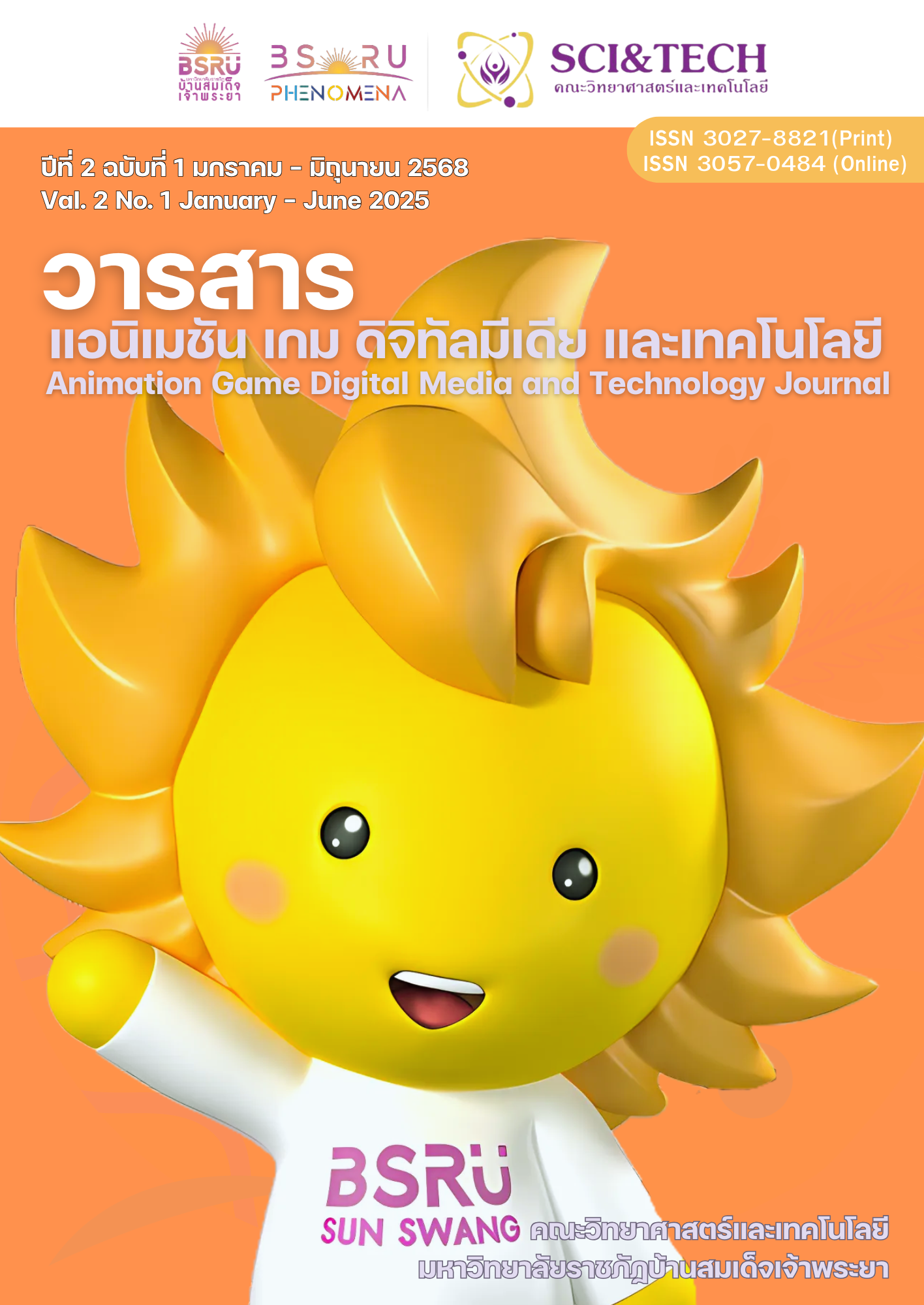Mobile Game Application for Enhancing English Language Learning for Fifth-Grade Students
แอปพลิเคชันเกมบนอุปกรณ์เคลื่อนที่เพื่อส่งเสริมการเรียนรู้ภาษาอังกฤษสำหรับนักเรียนชั้นประถมศึกษาปีที่ 5
Keywords:
Application, Game, English Language, Mobile DeviceAbstract
This research aimed to 1) develop a mobile game application for enhancing English language learning for Grade 5 elementary school students, and 2) evaluate the quality of the application as well as the satisfaction of its users. The game application was designed and developed using a 2D game approach focused on enhancing vocabulary, conversation, and reading skills through two types of in-game activities: a vocabulary matching game and an English task-based game, in which players must pass a test to progress to the next level. The sample consisted of 25 Grade 5 students selected through simple random sampling from schools located in urban areas of Muang District, Ubon Ratchathani. The instruments used in this study included the mobile game application for promoting English learning for Grade 5 students, a prototype application usability assessment, and a user satisfaction evaluation. Data analysis was performed using descriptive statistics such as mean and standard deviation.
The results of the study showed that the developed game application was compatible with the Android operating system. Expert evaluations revealed that the application was highly appropriate ( = 3.95, S.D. = 0.81). The evaluation of student satisfaction indicated a high level of satisfaction ( = 4.37, S.D. = 0.71). The findings suggest that this mobile game application is an effective tool for enhancing English language learning in an engaging and interactive manner for Grade 5 elementary school students.
References
Hamilton M T., Artharo A., Sumethaso B. English Language: The Speaking Fluency of Primary Thai Students. Journal of English Language and Linguistics 2024;5(1):110-9.
ชัชรีย์ บุนนาค. ปัญหาการเรียนการสอนภาษาอังกฤษในประเทศไทยและข้อเสนอแนะด้านยุทธศาสตร์การพัฒนาการเรียนการสอนภาษาอังกฤษ ปี 2564–2568. ใน: รายงานการประชุม Graduate School Conference; 30 พ.ย. 2561; กรุงเทพมหานคร, มหาวิทยาลัยราชภัฏสวนสุนันทา; 2561. หน้า 235-41.
อารีวรรณ เอี่ยมสะอาด. การจัดการเรียนการสอนภาษาอังกฤษในระดับประถมศึกษา. วารสารวิชาการมหาวิทยาลัยราชภัฏบุรีรัมย์ มนุษยศาสตร์และสังคมศาสตร์ 2561;10(1):31-45.
Phetsangkhad P K. Exploring the Thai EFL landscape: Implications for English language teaching. Law and Humanities Quarterly Reviews 2023;2(1):44-50.
Lozarito K K S, Segumpan M V J. Effectiveness of Digital Games in Students' Vocabulary. International Journal of English Language Teaching 2022;10(3):8-14.
Opincāne M, Laganovska K. Applying of design thinking approach in the development of foreign language course. In: Society. Integration. Education. Proceedings of the International Scientific Conference; 2023 May 26; Kaunas, Lithuania. Vol. 1. p. 155-164.
เอกรินทร์ วทัญญูเลิศสกุล, วจิราภรณ์ ประชุมรักษ์, ธัญลักษม์ ดีกา, ภักศจีภรณ์ ขันทอง. การพัฒนาต้นแบบแอปพลิเคชันคัดกรองภาวะสมองเสื่อม. วารสารเทคโนโลยีอุตสาหกรรม มหาวิทยาลัยราชภัฏอุบลราชธานี 2567;14(2);29–41.
ณัฐวราพร เปลี่ยนปราณ. สุทัศน์ นาคจั่น. การเรียนรู้คำศัพท์ภาษาอังกฤษโดยใช้เกมประกอบการสอนของนักเรียน ชั้นประถมศึกษาปีที่ 6 โรงเรียนวัดทุ่งน้อย อำเภอ กุยบุรี จังหวัดประจวบคีรีขันธ์. Veridian E-Journal Silpakorn University 2558;12(6):1672-84.
กัลยา จันเลน, ผาสุข บุญธรรม, สุดาพร ปัญญาพฤกษ์. การพัฒนาทักษะการฟัง และการพูดภาษาอังกฤษของนักเรียนชั้นประถมศึกษาปีที่ 3 โดยการใช้เกม. วารสารบัณฑิตศึกษา มหาวิทยาลัยราชภัฏเชียงราย 2558;8(18):99-106.
ภานรินทร์ ไทยจันทรารักษ์, ภัทรินธร บุญทวี, วงจันทร์ พูลเพิ่ม. การใช้เกมคำศัพท์ภาษาอังกฤษเพื่อพัฒนาการเรียนรู้คำศัพท์ภาษาอังกฤษของนักเรียนโรงเรียนสาธิตมหาวิทยาลัยราชภัฏบุรีรัมย์. วิวิธวรรณสาร 2564;5(1):163-84.
Downloads
Published
How to Cite
Issue
Section
License
Copyright (c) 2025 Animation Game Digital Media and Technology Journal

This work is licensed under a Creative Commons Attribution-NonCommercial-NoDerivatives 4.0 International License.






